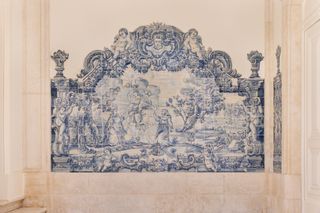Previously known for the vividness of its winding streets, the UNESCO World Heritage sites scattered across its 100 square-kilometers surface, its genre-bending architecture, and pastel de nata — moreish baked custard tarts worth the trip alone — Lisbon has lately risen as one of the hottest art and design capitals. With lower rental prices than most European countries and tax incentives established to attract global talent, the city is a cosmopolitan breeding ground for creativity. Playing host to trailblazing events such as ARCO LISBOA Contemporary Art Fair, Lisbon by Design, and Lisbon Design Week, and home to innovation-focused institutions like the Museu do Design (MUDE) and Museum of Art, Architecture and Technology (MAAT), the city should be on every culture aficionado’s bucket list. As if it weren’t enough, a pleasantly temperate climate blesses it year-around, making it a go-to solution for those traveling outside of traditional holiday periods.
Now, what if I told you I know of a hotel that allows you to continue soaking in Lisbon’s artistic pulse from its rooms, expanding on the local cultural heritage rather than disrupting it? First unveiled in July, the debut Portuguese property of lifestyle aparthotel brand Locke, Locke de Santa Joana, does just that. With 370 rooms ranging from standard rooms to apartments, penthouses, and suites, it brings warmth, comfort, and unexpectedly generous proportions to hotel design. Located within close proximity of Lisbon’s tree-and-tile-laden boulevard Avenida da Liberdade, Locke de Santa Joana is ideal for vacationers curious to discover what the country’s biggest city has to gift, travelers keen to break free of the disposable logic of fast tourism through longer sojourns, and professionals wanting to infuse their business trips with design-led inspiration.
To learn about the ins and outs of Locke’s largest project to date, I spoke with Spanish designer Laìzaro Rosa-Violaìn — who oversaw the making of its communal areas — about the reflections, obstacles, and inspirations that shaped it into form.
The Property — History Revamped
There is something profoundly fascinating about a 17th-century religious site being restored as a hospitality property where people from all walks of life can breathe its original architectural grandeur. A former convent, Locke de Santa Joana has been reinvented in a joint effort between design studios Laìzaro Rosa-Violaìn and Post Company, who conceived its vibrant rooms. Before joining the project, “we had never worked in such an ancient, storied building like this one,” designer Rosa-Violaìn tells me. “When we first visited the site, we completely fell in love with it and instantly knew we wanted to be involved in its transformation.”
Cementing the heritage-conscious approach that has characterized the convent’s revamping, Locke de Santa Joana showcases thousands of artifacts gathered throughout the reconstruction in its onsite museum. With a monumental, Pompeian red entrance, the gallery is an unexpected addition to the hotel’s offering, making it an especially valuable destination for lovers of art and design exhibitions.

(Image credit: Locke de Santa Joana. Design: Laìzaro Rosa-Violaìn)
Spectacular white and Rosa Portugal marble columns, capitals, and arches delicately delineate the silhouettes of the hotel’s public areas and serviced rooms in a dialogue between old and new. Elsewhere, like in the convent entrance, the convent suite, and in the sophisticated, soon-to-launch cocktail bar, ‘O Pequeno’, beautifully preserved azulejos tiles add a touch of blue to its earthy interiors. Though this interplay of authentic and contemporary details is what makes Locke de Santa Joana stand out from its competitors, Rosa-Violaìn doesn’t deny its timeless aesthetic comes with some challenges.
As the building has protected status, “a very high percentage of its elements had to be maintained”. This meant that every new layer had to adapt to the existing ones. Still, “from the enormous dimensions of the spaces and the ornaments of their architectural volumes to the carpentry, everything was deeply inspiring for us,” says the designer, confessing that the project pushed the studio into previously uncharted directions.
The Design — An Oasis for the Inspired Wanderer
Gone are the days of neutral-hued, barely decorated hotel lobbies: at Locke de Santa Joana, maximalism comes to the fore in an immersive mismatch of prints, textures, shapes, colors, and materials — sparking both comfort and joy. From wooden carved coffee tables and organic planters to plush, soft furniture inspired by 1980s design’s “bubble shape” renaissance, the hotel’s interiors are a masterpiece of curation. “All the common areas part of our scope were designed to rekindle the different spaces’ soul,” explains Rosa-Violaìn, who paired contrasting materiality, furniture, and decorative accents with art to unleash their “warm, eras-spanning atmosphere”.
Specifically created for travelers who like to balance aesthetics and functionality, “each space oozes with its own character and language”. Take the California cool of the pool area’s rich wood and rattan finishes, constellated by buttery vintage sun loungers; or the homely, modern rustic ambiance of the Santa Marta restaurant and Café Castro, both pictured above. Pay attention to the groin vaulted ceiling of the spirited O Pequeno bar, now plastered for an elevated feel — these are just examples of how, at Locke de Santa Joana, classicism and contemporaneity collide in an eclectic result that, to put it in Rosa-Violaìn’s words, “moves beyond fashion and commercialism”.
The Rooms — Lisbon’s Art and Culture Made Livable
As for the hotel’s rooms, the designs speak for themselves. The brainchild of Post Company, they are “a celebration of culture and art”: entirely modeled out of locally sourced fabrics, ceramics, and stone finishes in a nod to the Portuguese artisanry tradition. The 370 available rooms — starting at $114.73 for a double room — let the creativity and mellowness of Lisbon in through wide, loft-style windows, balconies, or terraces, depending on the type of room you book.
Here, Locke de Santa Joana’s overarching vision manifests in the encounter between naturally-colored, tactile surfaces referencing its history, and innovative lighting, bespoke furnishings, and fully equipped kitchens heralding a new understanding of hospitality. Flower vases, wall art, fruit bowls, rugs, cooking utensils, and standing lamps — once a prerogative of home decor — abound in this holiday stay, which invites us to rethink what a vacation feels and looks like.

Casa Cubista Terracotta Pitcher — Handmade Portuguese Authenticity for Your Table
Material: Terracotta
Price: $65.97
The Life — An Exploration of Sight, Sound, and Taste
Led by London-based hospitality incubator White Rabbit Projects and music and culture operator Spiritland, respectively, Locke de Santa Joana’s culinary and drink locations live up to the splendor of its premises. Opened in July as part of the hotel’s launch, the two hotspots currently open onsite — all-day dining restaurant Santa Marta and Café Castro — translate the vibrancy of their interiors into Mediterranean delicacies prepared with the finest local produce. With a pool-view, scenic terrace, Santa Marta is a feast for all senses; expect a tantalizing exploration of Southern European cuisine combining traditional Portuguese charcuterie and cheese with the freshest seafood, zingy fish, and succulently charcoaled meat. An intercontinental breakfast-cum-brunch menu comes courtesy of Café Castro — a bohemian eatery serving anything from reinvigorating smoothies and juices to baked goods, Italian-inspired sandwiches, and seasonal fruit.
Readers dreaming of a late-fall Lisbon getaway will only be pleased to hear the buzzing hotel is about to reveal three new bars, including Spiritland, Locke de Santa Joana’s music-led underbelly; The Kissaten, a groovy listening venue boasting “Portugal’s largest whisky collection; and Champagne-and-Martini, classy bar O Pequeno. Also scheduled to open shortly is the brasserie Santa Joana, nestled in the old convent helmed by an internationally renowned chef.
Weaving Lisbon’s multifaceted mythology into an ambitious project floating between present and past, the hotel is a time capsule of Portuguese idiosyncrasy — the latest treasure in the city’s embrace.






